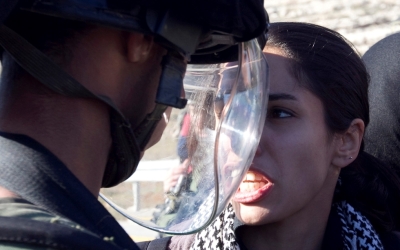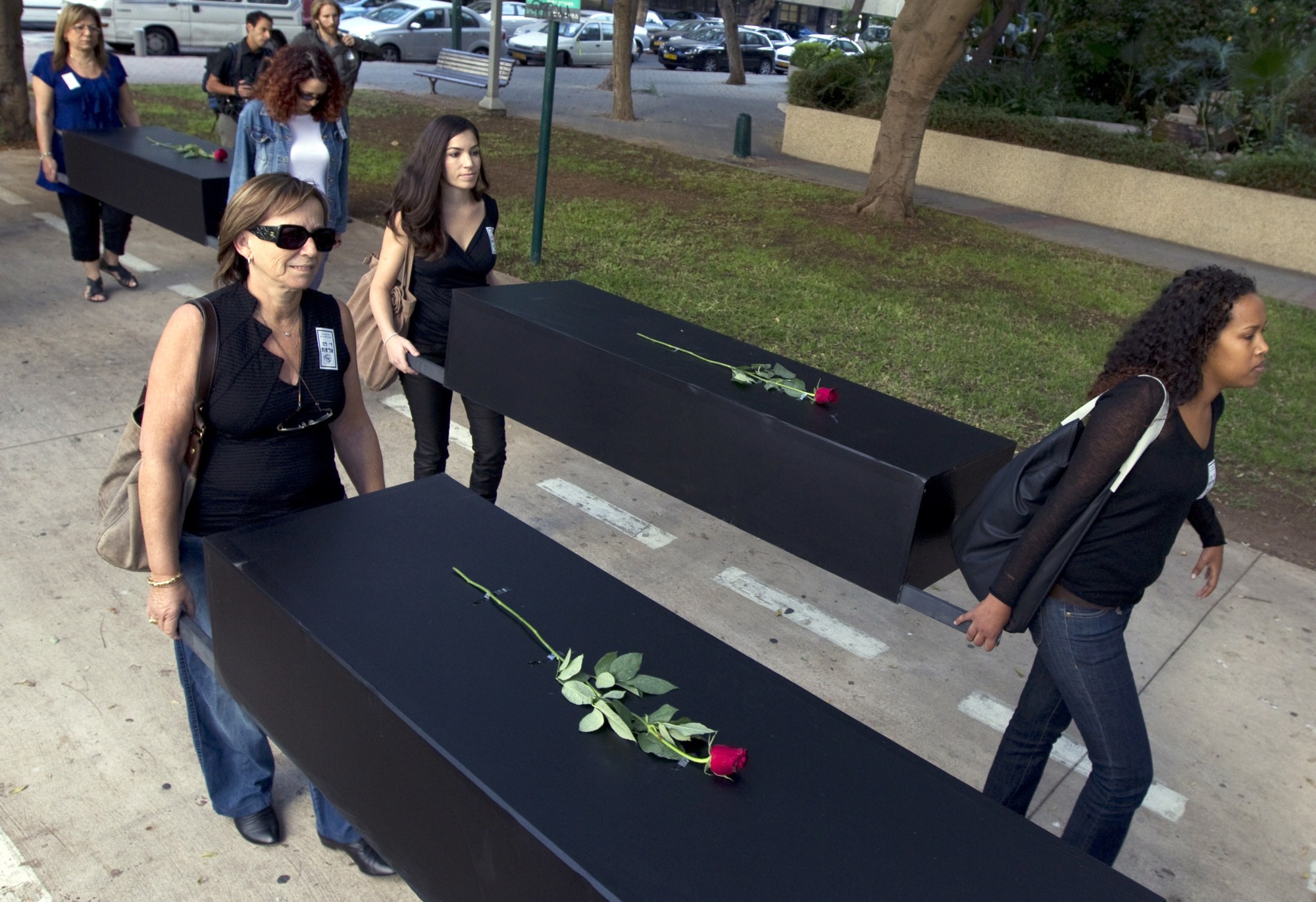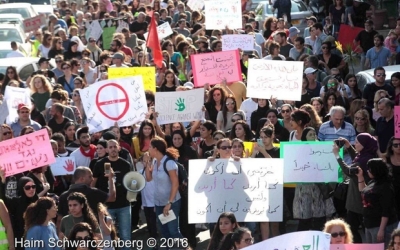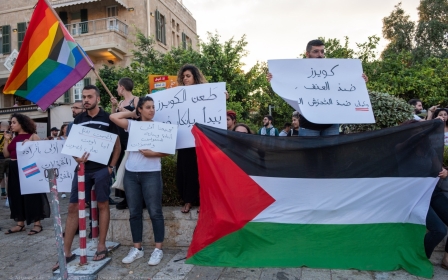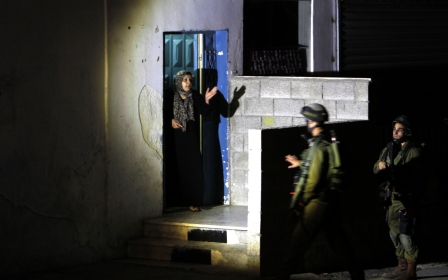Huge rise in violence against women in Israel met by poor response by government
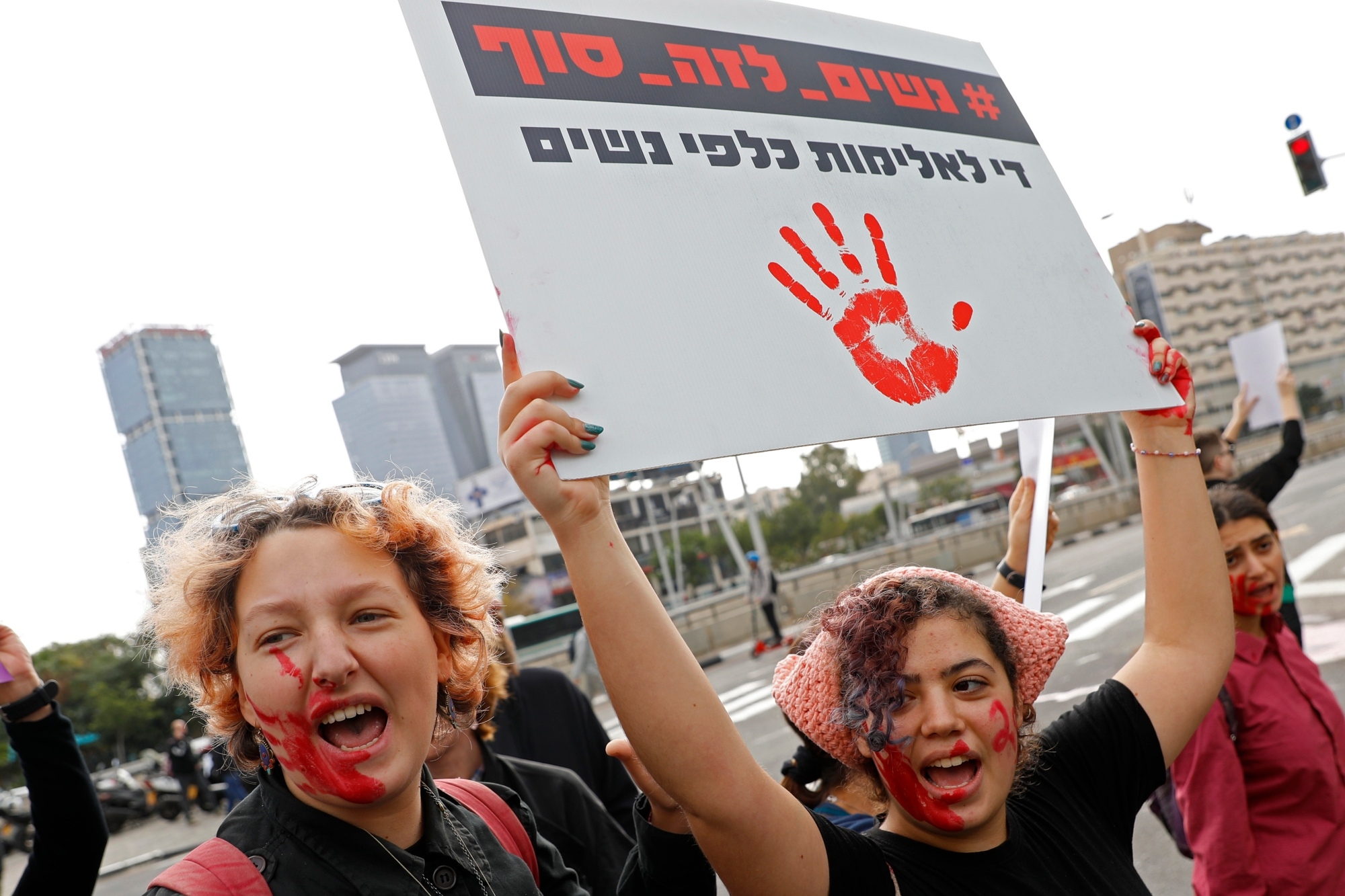
Israel is experiencing a wave of violence against women as the impact of the coronavirus lockdown has exacerbated the deep gender divides and institutional sexism that exist across the country.
Since March, domestic violence hotlines throughout the country have reported three- and four-fold increases in calls in contrast to the same time period last year. Emergency shelters for battered women are full.
Much of this increase can be attributed, experts say, to lockdowns due to the Covid-19 pandemic, which is forcing families to live closely together for long periods of time amid increasing financial and social stress.
On Wednesday, tensions over the rise in violence against women were further enflamed by a scripted speech by Israeli Prime Minister Benjamin Netanyahu to mark the International Day for the Elimination of Violence Against Women.
Speaking in Israel's parliament, the Knesset, Netanyahu remarked that, if society understood that animals should be protected from violence, it should understand the same about women.
New MEE newsletter: Jerusalem Dispatch
Sign up to get the latest insights and analysis on Israel-Palestine, alongside Turkey Unpacked and other MEE newsletters
"Women aren't animals that you can beat, and today we say you don't hit animals either," Netanyahu said.
"We understand that animals, too, have understanding and intelligence and cognition and feelings. We rightly have compassion for animals. Well, women are animals, children are animals - animals with rights... "
The PM's remarks led to a flood of comments, in the mainstream press as well as on social media. MK Ofer Shelah from the Yesh Atid party quipped: "The prime minister is an animal too. He has intelligence and cognition and rights - such as the right to utter such nonsense."
To date, 20 women have been murdered by their spouses or family members in 2020, up from 13 in 2019, according to Ynet news.
Israeli women's organisation Na'amat estimates that some 200,000 women face violence from their spouses or intimate partners in Israel, a crisis spanning the country and affecting all segments of society.
Impact of the pandemic
Women's rights activists argue that Netanyahu's speech, coming in the wake of a rise in sexist violence, shows how far Israel still needs to go in order to end gender-based violence and create a safe, egalitarian society.
"We were seeing normative families reporting violence for the first time, as well as a worsening of the situation in families that have long been in the cycle of violence," said Rivka Neuman, head of the women's advancement division at the Women's International Zionist Organisation (Wizo), which operates two shelters and a hotline in Israel.
As a result of this increase in violence, by the end of the first lockdown in the early summer, several women's groups provided the government with detailed plans to fight domestic violence, including specific recommendations such as placement of social workers in police stations, provision of emergency beepers and contacts that allow women to call for help, and programmes for new ways to assess the threat posed by men suspected of being violent.
However, between the first and second shutdowns due to the virus, the government took no concrete steps to improve the situation.
In October, as the second shutdown was beginning, two unrelated women, one Jewish and one Palestinian, were killed within two hours of each other. Another was murdered several days later. All three had been abused before they were murdered and had reported the abuse to the authorities.
Oded Forer, the head of the Knesset statutory committee on the advancement of women and gender equality, noted that "sadly, the government does not emphasise the social impact of the lockdown and limitations in any way".
At a special meeting of the Knesset committee in October, a review of government actions over the past two decades revealed that the national comptroller has not issued a report on violence against women in Israeli society for over 18 years.
In his last report, issued in 2002, the comptroller was harshly critical of the government's inaction and defined violence against women as a social issue that required systematic and effective intervention.
Twelve years later, in 2014, the government established an interministerial committee to propose a plan for the prevention and treatment of gender-based domestic violence. In 2016, the committee presented its plan to the government, which approved it in 2017 and committed to spending 250 million shekels ($75.25m) for its implementation.
However, none of that funding was ever provided to the relevant ministries and authorities.
"The only conclusion that we can draw from the continued acts of violence against women is that the government simply doesn't care enough," columnist Batel Kolman, a publicist writing in right-wing daily Mekor Rishon observed. "Women's blood is not red enough."
Longstanding barriers
The struggle against gender-based violence in Israel faces institutional and social barriers.
Despite training provided by feminist groups, the police continue to be one of those barriers. Between 2016 and 2019, according to public information service Meida, 77 percent of cases opened due to domestic violence were closed without reaching indictment or trial.
Moreover, one out of three women who were murdered had filed at least one complaint with the police in the years prior to their death, with police failing to take appropriate action.
When a violent man is arrested or brought to trial, the courts often attach great importance to the suspect's rights, and, in the case of conviction, tend to hand out light sentences.
In a highly publicised case that took place just before the Jewish holiday of Rosh Hashanah in September, a man stabbed and beat his wife as their toddler child crawled near her.
The woman was critically injured but survived. Under Israeli law, she could have remained anonymous, but agreed to have her name published "so that the whole country" would know what her husband had done to her.
Even the police stated that the public had the right to know his identity and that publishing his name might embolden other victims to step forward.
However, when he was brought to the courts for arraignment, the judge agreed to the husband's request to bar his name from being made public, arguing that "publishing the suspect's name will not contribute to consolidating and promoting the public interest," further arguing that such a move could also damage the accused's reputation and possibly ruin his relationship with his son.
Later that month, a man suspected of beating his wife so badly that she died after several days in the hospital was placed under house arrest. He broke the arrest conditions and came to the hospital in an attempt, police assume, to "finish the job".
A report issued by the Israel Women's Network noted that, contrary to many other countries, in Israel, most treatment of violence focuses on protecting women and their children.
'Not only are the shelters 90 to 95 percent full at the best of times, but now... in lockdown, no one is leaving the shelters, and there is really no room'
- Orit Sulitzeanu, Association of Rape Crisis Centres
"The enactment in 1991 of the Prevention of Domestic Violence Law (5751-1991) was the first attempt to create a framework for treatment programmes for perpetrators," the report read. "However, perpetrators' rehabilitation has yet to become mandatory.
"An additional significant difficulty emerges from the absence of communication and coordination among the various existing treatment frameworks," the report continued.
"The most disconcerting finding is that among perpetrators who have been imprisoned - including those who are defined as 'dangerous' - the majority are released without being placed in a rehabilitation programme and/or expressing commitment to enrol in such a programme."
Illustrating this concern is the case of a man who murdered his ex-wife in April, only one month after he was released from prison after serving time for committing violent offences against her.
The Ministry for Internal Security had announced that it would establish a unit to monitor and treat such men following their release from prison by September, but the unit is still only in the preliminary phase of establishment, and the police and the Public Security Ministry have declined to say when it will open.
NGOs step in
In the absence of a comprehensive public programme, feminist NGOs in Israel have been providing services for women facing gender-based violence for more than three decades.
Several feminist Israeli organisations, in both the Arabic- and the Hebrew-speaking communities, maintain shelters to which women suffering from extreme violence can escape; some allow them to escape with children, as well. But as Orit Sulitzeanu of the Association of Rape Crisis Centres notes, these shelters alone cannot provide a full response to the problem at this time.
"Not only are the shelters 90 to 95 percent full at the best of times," she says, "but now... in lockdown, no one is leaving the shelters, and there is really no room."
During the latest lockdown, Gun-Free Kitchen Tables, an ad hoc feminist coalition, was able to persuade the minister of internal security to instruct all private security firms to collect the firearms of the workers that they have laid off.
In response to demands by feminist organisations, social workers who specialise in domestic violence are continuing to work regularly after they were exempt from the emergency lockdown orders issued by the government.
Organisations have been working with both Jewish and Palestinian communities inside Israel in an attempt to provide culturally sensitive responses to domestic violence.
"The needs of Arab women have long been neglected by the state authorities," said Maya Shehade-Switat, a lawyer at Itach-Ma'aki, using the common term in Israel to refer to Palestinian citizens of Israel.
"Most of these problems are not new, but the coronavirus crisis has both created new problems and placed a magnifying glass over the existing situation.
"Levels of femicide are higher in the Arab sector for many reasons," Shehade-Switat noted. "There are also a tremendous number of weapons in Arab society, but almost all of it is illegal - so efforts such as those of Gun-Free Kitchen Tables do not provide solutions.
"Furthermore, Arab families tend to be larger, and since the Arab population is, on average, much poorer than the Jewish population, their housing conditions are poorer and much more crowded."
Religious court bias
The legal status of religion also plays a systemic role in perpetuating gender-based violence. Because there is no civil marriage or divorce in Israel, it is only possible to obtain a legal divorce via state-operated rabbinic courts for Jews and state-operated sharia courts for Muslims.
These courts conduct divorce proceedings in accordance with their interpretations of religious law, which tend to favour men.
'Unless we can change the way we see this and take care of it the way it should be taken care of, we cannot see it changing'
- Anita Friedman, chairwoman of Wizo
Women are thus often bound to violent men without any legal way to extract themselves from the marriage.
Feminist activists believe that gender-based violence against women continues because it is largely seen as a women's problem. "This is a societal issue," said Anita Friedman, chairwoman of Wizo. "Unless we can change the way we see this and take care of it the way it should be taken care of, we cannot see it changing."
Attorney and senior researcher at the National Institute for Security Studies Pnina Sharvit Baruch writes in a new report that it "is high time that the government relate to violent family members as an existential security threat".
"As in matters of security, there should be one authority to coordinate all of the aspects and programs dealing with the problem," she states. "This authority should have a full, intelligence-based picture of the situation."
Above all, Baruch-Sharvit concludes, "we need to change our perceptions".
"We must define gender-based violence as a national threat that demands the attention of decision-makers at the highest levels."
Middle East Eye delivers independent and unrivalled coverage and analysis of the Middle East, North Africa and beyond. To learn more about republishing this content and the associated fees, please fill out this form. More about MEE can be found here.


